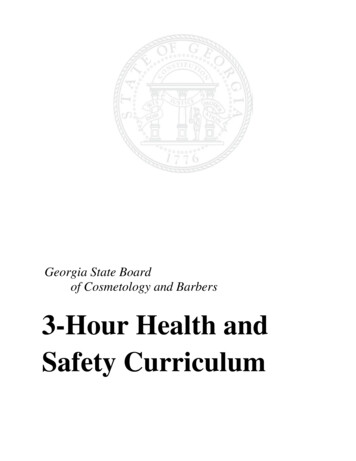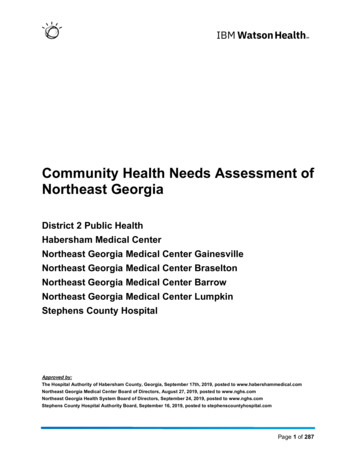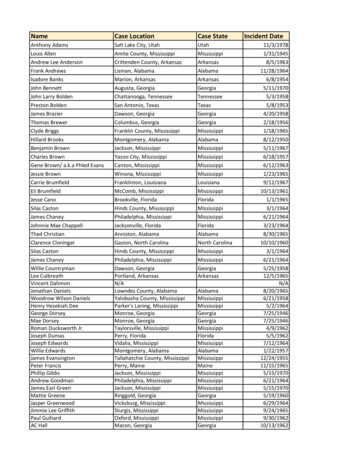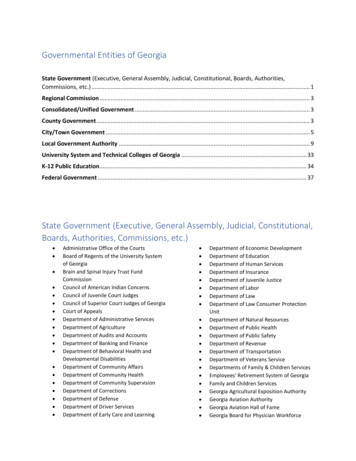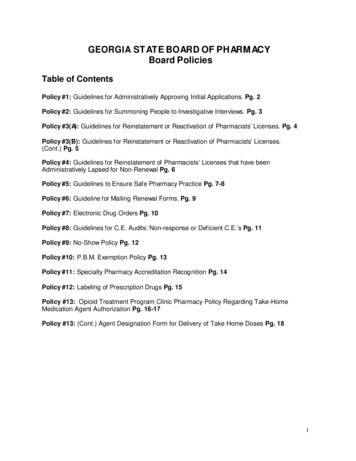
Transcription
GEORGIA ST AT E BOARD OF PH ARM ACYBoard PoliciesTable of ContentsPolicy #1: Guidelines for Administratively Approving Initial Applications. Pg. 2Policy #2: Guidelines for Summoning People to Investigative Interviews. Pg. 3Policy #3(A): Guidelines for Reinstatement or Reactivation of Pharmacists’ Licenses. Pg. 4Policy #3(B): Guidelines f or Reinstatement or Reactivation of Pharmacists’ Licenses.(Cont.) Pg. 5Policy #4: Guidelines for Reinstatement of Pharmacists’ Licenses that have beenAdministratively Lapsed for Non-Renewal Pg. 6Policy #5: Guidelines to Ensure Safe Pharmacy Practice Pg. 7-8Policy #6: Guideline for Mailing Renewal Forms. Pg. 9Policy #7: Electronic Drug Orders Pg. 10Policy #8: Guidelines for C.E. Audits: Non-response or Deficient C.E.’s Pg. 11Policy #9: No-Show Policy Pg. 12Policy #10: P.B.M. Exemption Policy Pg. 13Policy #11: Specialty Pharmacy Accreditation Recognition Pg. 14Policy #12: Labeling of Prescription Drugs Pg. 15Policy #13: Opioid Treatment Program Clinic Pharmacy Policy Regarding Take-HomeMedication Agent Authorization Pg. 16-17Policy #13: (Cont.) Agent Designation Form for Delivery of Take Home Doses Pg. 181
Board Policy #1In the September 15, 1998 Board Meeting, the Georgia State Board of Pharmacyvoted to adopt the following as Board Policy. In the May 13, 2003 BoardMeeting, the Board revisited this policy and made amendments.Guidelines for Administratively Approving Initial Applications.Applications will be approved administratively once all criteria as outlined in the lawand Board rules have been met. The administrative processing of licenses meansthat the Board staff has reviewed the documents and approved licensure basedupon the laws, rules and board policies that pertain to that specific type of licensure.License reinstatements will be administratively processed in compliance with theBoard’s current Reinstatement/Reactivation Policy. The Board will review anyapplicant with an affirmative answer to the conviction or Board sanction questions.Administratively issued licenses are considered for a vote to ratify at the nextregularly scheduled board meeting.2
Board Policy #2In the September 15, 1998 Board Meeting, the Georgia State Board of Pharmacyvoted to adopt the following as Board Policy. In the May 13, 2003 BoardMeeting, the Board revisited this policy and made amendments.Guidelines for Summoning People to Investigative Interview s1. The Board secretary is to record the vote at the Board meeting for an investigativeinterview.2. The Board secretary is to work with the Cognizant Board Member and GDNA toestablish a date and time for each investigative interview.3. The Board secretary shall reserve a meeting room for the investigative interview.4. The Board secretary will notify each person scheduled, of the place, date and timefor their investigative interview, allowing the persons scheduled ten (10) days afterreceipt of the letter of notification to notify the Board of whether or not he he/she willattend the interview. This notification will be sent via certified mail along with a signedreturn receipt to be sent back by the persons scheduled.5. One week prior to the scheduled investigative interviews, the Board secretary shallnotify the Cognizant Board Member, the GDNA and the Board’s attorney of thosepersons scheduled to attend, those who will not attend and/or those who have notresponded to the Board’s notification letter.3
Policy#3AGuidelines for Reinstatement/Reactivation of Pharmacists’ Licenseswho have NOT been actively practicing pharmacy for the past four(4) years or longer.(This pertains to a pharmacist whose license is on “Inactive” status or administrativelylapsed due to non-renewal, voluntarily surrendered or suspended for disciplinary reasons.)The applicant must complete the following:1. All applicants must submit the completed application to the Board’s officefor reinstatement/reactivation.2. Re-take and achieve a passing score on the Jurisprudence Examination (MPJE)3. Complete and submit proof of 30 hours of Pharmaceutical Continuing Education.4. Pay all back renewal and/or penalty fees.Once the above conditions have been met, the Board staff will forward the f ile to the AG’soffice for issuance of a consent order requiring:1. Applicants who have been out of practice between four (4) or more years will be requiredto work under direct supervision in an “Intern-like” setting as follows:4 years – 1000 hours5 years – 1100 hours6 years – 1200 hours7 years – 1300 hours8 years – 1400 hours9 years – 1500 hours10 years – 1600 hours11 years – 1700 hours12 years – 1800 hours13 years – 1900 hours14 or more years – 2,000 hoursW hen working in this “Intern-like” setting, an applicant can work a minimum of twenty (20)hours and a maximum of fifty (50) hours per week. At the completion of this practice, thesupervisor must provide an affidavit attesting to the applicants’ level of competency.2. Once the hours are completed, all applicants must take and pass the Georgiapractical examination.3. Applicants may choose to complete 1000 hours in an “intern-like” setting and retakeand pass the NAPLEX in lieu of working the total number of hours required above.In its discretion, the Board MAY require one or all of the following: Applicants who have beenout of practice for over ten (10) years may be required to re-take and achieve a passing scoreon the NAPLEX.1. Submit further evidence of competency or stipulations as may be determined by theBoard.2. Inclusion in the CE audit pool for the upcoming renewal cycle.3. Board may request to meet with licensee prior to license being reinstated.4
Policy#3BGuidelines for Reinstatement/Reactivation of Pharmacists’ Licenseswho HAVE been actively practicing pharmacy during the past four(4) years.(This could pertain to a pharmacist whose license is on “Inactive” status, or a pharmacistwhose license was administratively lapsed due to non-renewal, voluntarily surrendered orsuspended for disciplinary reasons.)1. Applicants must submit a written request to the Board’s office for reinstatement/reactivation.2. Pay all back renewal and/or penalty fees.3. Complete and submit proof of 30 hours of Pharmaceutical Continuing Education obtainedduring the past two (2) years.4. Submit a Curriculum Vitae (C.V.) indicating past work activities, going back to date ofexpiration.5. If licensed in another state, have verification of license forwarded to the Georgia State Board ofPharmacy’s office.If the license was administratively lapsed due to non-renewal the board, in its discretionmay also require one or all of the following:1. Inclusion in the CE audit pool for the upcoming renewal cycle.2. Board may request to meet with licensee prior to license being reinstated.5
BOARD POLICY #4In the November 17-18, 1998 Board Meeting, the Georgia State Board of Pharmacyvoted to adopt the following as Board Policy. In the February 12, 2008 Board Meeting,the Board revisited this Policy and amended as needed.Guidelines for Reinstatement of Pharmacists’ Licenses that have beenAdministratively Lapsed for Failure to Renew .It is the Board’s Policy that licenses that have been Administratively Lapsed due tononrenewal shall be reinstated to include the following stipulations:1. Pay a reinstatement fee plus a renewal fee for each licensing renewal period thatthe pharmacist did not renew his/her license. Current fees may be found on theapproved fee schedule.2. Complete and submit proof of 30 Hours of Pharmaceutical Continuing Education.3. Automatic Inclusion in the continuing education audit pool in the following biennium.4. Board may request to meet with licensee prior to license being renewed.5. Must also follow requirements in Policy 3(A) if applicant has not been activelypracticing pharmacy for the past four (4) years or longer.6
Board Policy #5In the October 22-23, 1997 Board Meeting, the Georgia State Board ofPharmacy voted to adopt the following as Board Policy. In the May 13, 2003Board Meeting, the Board revisited this Policy and made no amendments.Guidelines to Ensure Safe Pharmacy PracticePurpose: The Georgia State Board of Pharmacy has developed these guidelines toensure the protection of the health, safety and welfare of Georgia’s citizens as relatedto the scope and quality of Pharmacy Care and Services provided by the licensedPharmacies and Pharmacists under the Board’s jurisdiction.General Guidelines: The following guidelines constitute what the Board feels isnecessary to ensure Safe Pharmacy Practice: Each individual workplace should be designed to provide adequate space andworkflow design that will accommodate the workplace in an organized fashion. Computers and other automated equipment should be of a design that druginteractions and contraindications MUST BE REVIEWED BY THE PHARM ACIST.Further, the computer system should be of a design to support counseling, DURdocumentation and other safeguards to meet legal and regulatory requirements.Adequately trained or experienced professional and supportive staff levels shouldbe maintained to meet the demands of the practice site, workload and clienteleserved. It should be noted that both the number and the training or experiencelevel of all staff are important. Other factors that could increase staffing levelsinclude demand for OTC recommendations by customers, telephone interruptions,patient teaching and demands of managed care organizations and other third partyprograms. Staff should have the opportunity to take periodic “breaks” and/or meal periods torelieve fatigue and mental and physical stress. Staff should also have opportunitiesfor training and education to keep them abreast of new information and changes inthe field. Workload quotas or formulas such as strictly using the number of prescriptionsor orders processed to set staffing patterns must include other considerations suchas peak workload periods, workplace design, training of staff on duty, etc. toadequately meet the needs of the public.Discussion: Ensuring that practicing pharmacists and pharmacies serving the publicare providing accurately filled prescriptions, accurate and timely information for the useof the prescriptions filled and that the desired outcome of the therapy is achieved is theessence of Pharmacy Care. In today’s competitive marketplace, the issues related toachieving this should provide the opportunity to succeed.7
Institution of quotas and/or additional regulations would be difficult and hard to enforcebut might be required. Liability, responsibility and sanctions must be shared equitablyby the owner or management of the pharmacy and the individual practitioner. Inaddition to the above guidelines, the Board officers below, indicators that workload istoo great for the staff or the Safe Pharmacy Practice Guidelines are not being followedand disciplinary action may be in order.Indicators: An inordinate number of filling errors occur. Patients are not properly counseled. Patient or customer complaints. Continuing pharmacist complaints related to working conditions. Failure to comply with patient counseling or other rules and regulations. Inadequate supervision and training of supportive personnel.8
Board Policy #6In the January 26-27, 1999 Board Meeting, the Georgia State Board of Pharmacy votedto adopt the following as Board Policy. In the May 13, 2003 Board Meeting, the Boardrevisited this policy and made an amendment.Guideline for Mailing Renewal Forms1. ALL license renewals will be mailed at least ninety (90) days prior to expiration. Thisshall apply to all pharmacy and pharmacist renewals.9
Board Policy #7In the September 27-28, 2000 Board Meeting, the Board voted to develop a policypertaining to Electronic Drug Orders. In the May 13, 2003 Board Meeting, the Boardrevisited this policy and made amendments. Pursuant to O.C.G.A. §26-4-80(i), theGeorgia State Board of Pharmacy (Board) makes the following policy statement:ELECTRONIC DRUG ORDERS Computer or electronically generated prescriptions must bear the original signatureof the issuing practitioner. It is legal for the body of the prescription drug order to begenerated electronically, however, to be considered valid and legal, the practitionermust manually sign, in indelible ink, said drug order.Pursuant to O.C.G.A. §26-4-80(c), the Georgia State Board of Pharmacy (Board)makes the following policy statement:FACSIMILE PRESCRIPTION DRUG ORDERS It is valid and legal for a pharmacy to accept a prescription drug order, which istransmitted via facsimile, as long as the drug order has been sent by the practitioner orthe practitioner’s agent under the supervision of the practitioner. Prescription drugorders must be sent directly from the practitioner to the pharmacy without anyoneintercepting the order as transmitted by the practitioner.Drug orders submitted via facsimile shall include the following: Complete name and address of the practitioner; If for a controlled substance, the DEA registration number of the practitioner; The telephone number of the practitioner for verbal confirmation; Complete name and address of the patient; Time and date of the transmission; The full name of the person transmitting the order.Nothing in the Georgia Code prohibits an electronically/computer generated drug orderfrom being transmitted via facsimile as long as the drug order bears the originalsignature of the practitioner.10
Board Policy #8In the November 17-18, 1998 Board Meeting, the Georgia State Board of Pharmacyvoted to adopt the following as Board Policy. In the May 13, 2003 Board Meeting, theBoard revisited this Policy and amended as needed.Guidelines for C.E. Audits: Non-ComplianceIf a pharmacist is randomly selected for a Continuing Education Audit, does not provideproof of the required 30 hours of C.E. for the biennium, the pharmacist will need tocomply with the following in order to late renew or reinstate the license:1. The pharmacist must obtain two (2) C.E. credit hours for every one (1) C.E. credithour he/she is deficient.2. The pharmacist may be fined 50.00 per deficient hour, not to exceed a maximum of 500.00.3. A public reprimand that will become a permanent document in the licensee’s recordmay be issued to the pharmacist.The pharmacist may not use the additional required hours in the present or nextbiennium. The hours are to comply with the past renewal biennium and may not becounted again.11
Board Policy #9In the July 22-23, 2002 Board Meeting, the Georgia State Board of Pharmacyvoted to adopt the following as Board Policy. In the May 13, 2003 BoardMeeting, the Board revisited this Policy and amended as needed.No-Show PolicyAnyone who does not appear before the Board for his or her scheduledappointment without a valid reason, upon reapplying, will have a six (6) monthwaiting period.12
Board Policy #10In the September 17, 2003 Board Meeting, the Georgia State Board of Pharmacyvoted to adopt the following as Board Policy.P.B.M. Exemption PolicyPharmacy Benefit Managers (P.B.M.’s) are exempt from questions 5-8 on theapplication. These questions are considered exemptions as follows:5. Do you have a Class A Balance and other equipment as provided for under“Minimum Equipment for Prescription Department”, Chapter 480-10-.12 of theRules and Regulations?6. Does the store keep an exempt narcotic register?7. Are narcotics stored or locked in a secure place? Mixed with stock?8. Does the store keep a poison register?13
Board Policy #11In the October 12, 2011 Board Meeting, the Georgia State Board of Pharmacy voted to adoptthe following as Board Policy.Specialty Pharmacy Accreditation RecognitionPursuant to the authority delegated to the Board in O.C.G.A. § 26-4-28(a)(21), and acting as thesole governmental or other authority with the authority to (1) approve or recognize accreditationprograms for specialty pharmacy practice, and (2) determine the acceptability of entities whichmay accredit pharmacies or certify pharmacists in a specialty of pharmacy practice in the Stateof Georgia, the Board approves and recognizes the URAC Specialty Pharmacy AccreditationStandards, Version 2.0, July 2010 (“URAC Accreditation”) as an accreditation program forspecialty pharmacy practice.This policy does not require pharmacists or pharmacies to obtain URAC Accreditation as aprerequisite to specialty or advance pharmacy practice.At its meeting on November 18, 2015, the Georgia Board of Pharmacy voted to recognizeACHC (Accreditation Commission for Healthcare) as an accreditation agency.14
BOARD POLICY #12At its meeting October 22, 2014, the Georgia State Board of Pharmacy voted to adoptthe following as Board Policy.LABELING OF PRESCRIPTION DRUGSIn response to numerous inquiries about the proper labeling of prescriptions drugs, theGeorgia State Board of Pharmacy has examined the issue in light of state law.O.C.G.A. Section 26-4-80(k) expressly provides:All out-patient prescription drug orders which are dispensed shall be appropriatelylabeled in accordance with the rules and regulations promulgated by the board asfollows:(1) Before an out-patient prescription drug is released from the dispensing area, theprescription drug shall bear a label containing the name and address of the pharmacy, aprescription number, the name of the prescriber, the name of the patient, directions fortaking the medication, the date of the filling or refilling of the prescription, the initials oridentifying code of the dispensing pharmacist, and any other information which isnecessary, required, or, in the pharmacist's professional judgment, appropriate; and(2) The pharmacist who fills an out-patient prescription drug order shall indicate theidentity of the dispensing pharmacist on the label of the prescription drug. Identificationmay be made by placing initials on the label of the dispensed drug. The label shall beaffixed to the outside of the container of the dispensed drug by means of adhesive ortape or any other means which will assure that the label remains attached to thecontainer.Board Rule 480-27-.05 is consistent with this rule in regards to recordkeeping.However, it appears that O.C.G.A. Section 16-13-73 currently requires that whenever apharmacist dispenses a dangerous drug, the pharmacist shall place a label upon eachcontainer that has the name of the “physician” prescribing the drug. Since personsother than physicians are authorized to prescribe dangerous drugs under Georgia law,see, e.g., O.C.G.A. Section 16-13-78.1 and 16-13-70.1, the Board plans to ask theGeneral Assembly to pass legislation during the 2015 Session to make Code section16-13-72 consistent with the other statutory provisions and to eliminate any confusion inthis area.Until such time as the law can be changed, the Board will consider compliance withO.C.G.A. Section 26-4-80(k) and its rules regarding labeling to be compliance with thelaws and rules for purposes of any disciplinary action. That means that pharmacistsmay use the name of the prescribing or ordering practitioner on the label. A practitioneris a physician, dentist, podiatrist, physician’s assistant, advanced practice registerednurse, or other person licensed, registered, or otherwise authorized under the laws ofthis state to prescribe or order dangerous drugs or controlled substances.15
BOARD POLICY #13**This policy applies ONLY to Opioid Treatment Program (“OTP”) Clinic Pharmacies. In noway should any portion of this policy be construed to apply to any other type of pharmacy permitissued by the Georgia State Board of Pharmacy (“Board”). **The Director of Pharmacy Services of an OTP clinic pharmacy shall provide each patient with apre-printed agent authorization form or document. By signing this document, each patient will beable to authorize one or more licensed health care professional who is/are employed by the OTP tobe his or her authorized agent. A patient must sign and date a separate document naming eachlicensed health care profession the patient authorizes to be his or her agent. A patient can onlyauthorize a health care professional who is authorized by state law to administer medication.The take-home medication must have been previously prepared at the OTP by a pharmacist. Thetake-home medications for each patient must be labeled in accordance with all federal and statelaws and regulations. Each patient’s set of take-home medications must be maintained together ina package bearing the name of and other necessary information required to identify the patient.The OTP Director of Pharmacy must maintain a set of Policy and Procedures describing theprocedure by which patients authorize an agent to deliver their take-home medications to them,and describing how patients obtain their take-home medications from their agent. This proceduremust include at a minimum, but is not limited to:Details on how a patient’s take-home medications are transferred from the pharmacist tothe patient’s authorized agent,How a patient authorizes their agents by use of an agent designation formHow each authorized agent receives training from the pharmacist on receiving anddelivering take-home medications to patients.The names of all persons who are authorized to access the safe containing take-homemedications,What action is to be taken when a change is made in patient’s take-home medications,The record keeping involved in all phases of this procedure, andHow the take-home medications are delivered to the patient.Once each patient’s container of take-home medications has been transferred from the pharmacistto a patient’s authorized agent, the container cannot be stored in the pharmacy area safe. Thepatient’s authorized agent must secure each patient’s container of take-home medications in a safelocated outside of the pharmacy area. All safes and security systems in use to store a patient’stake-home medications must meet the minimum requirements set forth in U.S. Drug EnforcementAdministration (DEA) and U.S. Substance Abuse and Mental Health Services Administration(SAMHSA) rules and laws.The OTP Director of Pharmacy shall maintain a signed log and record detailing the quantity of thetake-home medication prepared and dispensed for each patient, the signature of the patient’sauthorized agent who received the take-home medication, and the signature of the patient whenhis/her medication was received from the authorized agent.A patient’s authorized agent may act as such only while on the property of the specific OTP wherethe patient receives his/her medication. A patient’s authorized agent can only deliver take-homemedications from the specific OTP where the patient receives his/her medication. The patient’sauthorized agent my not leave the OTP premises with any patient’s take-home medication, nor16
shall a patient’s take-home medication be delivered to the patient in any manner except thatauthorized by DEA and SAMHSA rules and laws.This policy is subject to any and all federal and state laws, rules and guidelines which address thedelivery of take-home medications at an OTP licensed and operated in the State of Georgia.October 200917
Agent Designation Form for Delivery of Take Home DosesI, , a patient at theOpioid Treatment Program Clinic (OTPC), do hereby designate, LPN/RN, GA License Number: ,a nurse licensed by the State of Georgia and employed at and by this treatment clinic as myagent to receive from the clinic pharmacist any and all of my prescribed OTPC take-homemedication doses and maintained at this OTPC. In turn, my agent will personally deliver allsuch take-home doses to me only at this OTPC clinic. It is my understanding that before thedelivery of such doses, each one will have been previously prepared by the pharmacist andplaced in a container displaying a prescription label with my name and all of the otherrequirements of Pharmacy Board Rule 480- 18-.06 and the rules and laws of SAMHSA and theDEA. I understand that a copy of this designation will be maintained by the OTPC pharmacyas a part of my patient record, and it shall remain in effect until such time as I revoke it, or itis revoked by the OTPC pharmacy or the OTPC clinic.Patient Signature: Date:(Printed Name of Patient: )Agent Signature: Date:(Printed name of Agent: )Signature of Pharmacist: Date:(Printed name of Pharmacist: )18
In the January 26-27, 1999 Board Meeting, the Georgia State Board of Pharmacy voted to adopt the following as Board Policy. In the May 13, 2003 Board Meeting, the Board revisited this policy and made an amendment. Guideline for Mailing Renewal Forms 1. ALL license renewals will be mailed at least ninety (90) days prior to expiration. This

